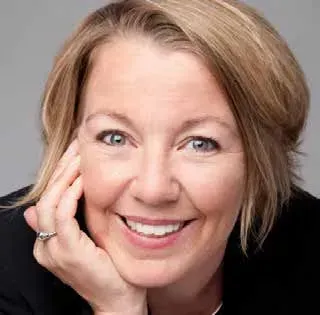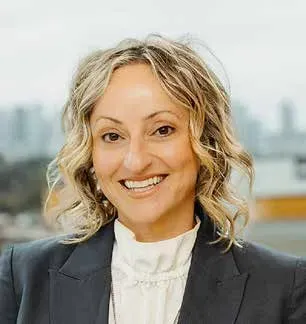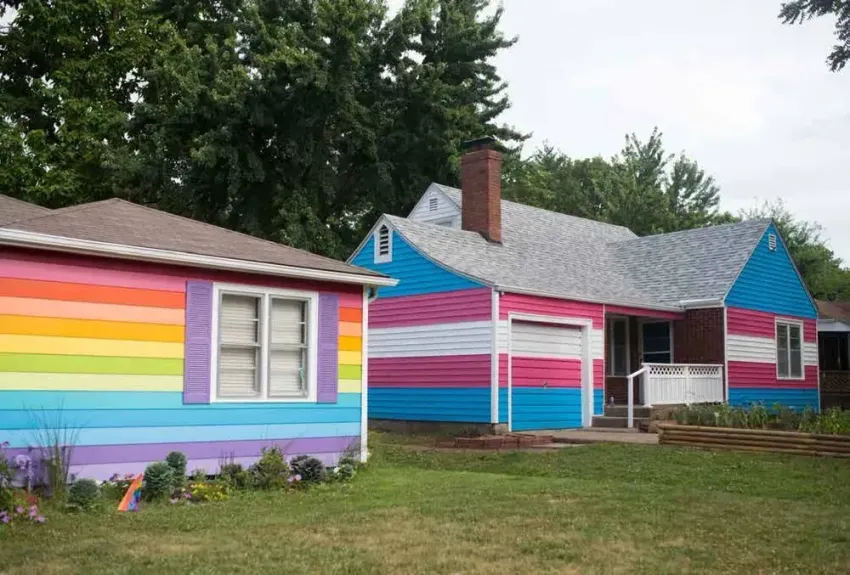In 2025, buying a home remains a tricky endeavor for those seeking to make Seattle their long-term place of residence. Despite a recent pledge by the Trump administration to increase homeownership and the lowering of interest rates by the Federal Reserve to 4–4.24% (which has knock-on effects on mortgage rates), a teetering job market and ongoing affordability crisis have left 72% of Americans feeling pessimistic that now is a good time to buy a house.
While there is no doubt that buying a home in the Seattle area today requires saving up a pretty penny (or several million of them), the SGN decided for this year’s Home & Finance issue to reach out to some Queer experts in the area’s real estate and home mortgage industry to share their perspectives on today’s housing market landscape, and offer any advice they may have for LGBTQIA+ people looking into available options.

Tips for homebuyers
Jeanne Sickel is branch manager and loan officer at CMG Home Loans in West Seattle. With her years of expertise in home financing, she gave the SGN several tips and guidance to share with LGBTQIA+ homebuyers on how to navigate the complexities of financing in Seattle’s market in 2025.
As a preface, Sickel began her advice by addressing the current home-buying climate: “Here’s my take on today’s real estate market and how buyers can break into homeownership, even in a historically tough market. Seattle has long been known as a competitive real estate market, and it continues to move at a relatively fast pace.
“However, after the intense activity of the spring season, we’re seeing a typical seasonal slowdown heading into fall. With people returning from summer vacations and kids back in school, this shift is normal — but it also presents new opportunities for buyers. Notably, inventory is up this year compared to last. That means more homes on the market, less competition, and more leverage for buyers. If you've been waiting for a window to enter the market, this could be it.”
The first tip Sickel has for Seattle’s Queer homebuyers is to use their leverage, and ask for seller credits or rate buy-downs. She explains that now with “more homes and fewer bidding wars, buyers can negotiate. In this market, you can ask sellers to cover your closing costs, offer a rate buy-down, or even reduce the price.
“But what’s the smartest option? Consider that a $10,000 price reduction might save you ~$60/month on your mortgage. Using that same $10,000 for a rate buy-down could save you $100+ per month — a better path to long-term affordability.”
The next tip she suggests people consider is buying a home together with friends. “More buyers — especially renters — are teaming up with friends to purchase homes together. This approach can dramatically lower your monthly costs and allow you to build equity as a team.”
Sickel gives an example of how this might work in practice: “If four friends bought a $1 million home five years ago, each person’s share would be $250K. Today, that home might be worth $1.22 million (4% average annual appreciation). After selling, each person could walk away with ~$25K in equity. Add in rent savings of ~$1,000/month per person over five years, and that's another $60K saved. It's a smart financial move, not just a living arrangement.”
Although splitting costs among friends can be mutually beneficial, she does caution that “if you go this route, protect your investment: Get legal agreements in place that detail ownership shares and what happens if someone wants out. Keep good records. Most importantly, set up wills and estate plans to protect everyone's interests.”
Another unconventional tip Sickel has for prospective homebuyers is to reconsider condos — especially DADU condos — explaining that “Seattle allows detached accessory dwelling units (DADUs) on single-family lots to be sold as ‘condos.’ But these don't always look or feel like traditional condos — they're often standalone small homes with their own yards and entrances. This is a creative and affordable path to ownership, especially for first-time buyers. Many have low or no HOA dues and are often priced significantly lower than traditional single-family homes, sometimes even less than traditional condos, which can carry HOA fees of $400–700/month.”
The last tip Sickel shared was that if living in a DADU isn’t an option, prospective homebuyers in need of more space might instead consider buying a house with a rental unit (accessory dwelling unit DADU, mother-in-law suite, or duplex) to help cut down on costs. She points out that “homes with secondary units offer built-in income potential. While the purchase price might be higher, rental income can offset your mortgage.”
As an example, she said that if the price of a home is $750K, with a 20% down payment and monthly payment of ~$4,300, having rental income from a separate unit charging $1,600/month would result in a net monthly cost of only $2,700, which is significantly lower than the $3,750 that average renters pay for a house in Seattle today, according to Zillow.
The benefits
Sickel believes the overall benefit of homeownership is worth the trouble: “One thing I’ve learned about homeownership: we all pay to live somewhere. When you rent, you're paying someone else's mortgage, and you're at the mercy of rising rents, landlord decisions, and potentially deferred maintenance. But when you own a home, your mortgage payment is largely fixed (aside from taxes and insurance), and you’re building something for yourself.
“Homeownership is more than shelter; it's a financial anchor. As you build equity, your home becomes a powerful tool. You can borrow against it to fund education, invest in another property, pay off debt, or navigate life's big moments.”
Sickel acknowledges that the homebuying elephant in the room — down payments — “can often be a big barrier for folks to get into homeownership. However, there are more options than most people realize: down payment assistance programs are available at the city, county, and state levels. Some lenders (like the one I work with) allow you to crowdsource your down payment — a normally ineligible source, now approved through special programs. Certain retirement accounts offer penalty-free withdrawals for first-time homebuyers. And there are even a few 0% down loan options worth exploring.”
Overall, Sickel encourages prospective LGBTQIA+ homebuyers not to give up. “For me, buying a home was the best decision I ever made for my financial future, she said, “and I’m passionate about helping others make that same step toward stability, security, and independence.”

Christina Castillo works at Ensemble, a boutique Seattle-based real estate brokerage founded in 2023. “I would say a lot of the brokers that make up Ensemble are part of the LGBTQ+ community,” she said, “but not necessarily focused on [LGBTQ+] buyers and sellers. But I think, you know, we end up probably working with a lot of buyers and sellers in the community.”
Castillo told the SGN that although about 90% of her LGBTQIA+ clients are looking for homes in the Seattle area, those considering more affordable options tend to look in more rural parts of Washington. The advice she usually gives them is to spend time in the community and get a feel for if it’s a good fit, explaining that “we’re in a bubble in Seattle for the most part, and [so when] going into small towns, I always encourage buyers to go eat at a restaurant, go to the grocery store, talk to the people, look for Pride flags hanging in other people’s yards.”
As for specific Queer-friendly housing markets outside of Seattle, Castillo explained that she makes an explicit effort as a realtor not to “steer” clients into specific neighborhoods, making sure she follows all guidelines under the Fair Housing Act. However, she did stress the importance of LGBTQIA+ buyers going out on their own to experience places firsthand to help them make their decision.
Another type of advice Castillo had for prospective Queer homebuyers was to heavily vet the people who’ll be part of their journey, saying it doesn’t matter “if it’s your realtor, if it’s your lender, you know because you want to be best represented by them.”
One aspect of Castillo’s work as a Queer-affirming realtor, she told the SGN, is to makes sure the people her clients come into contact with address them properly. She notes that sometimes not all Trans and Nonbinary clients will have legal documents that line up with their name or gender identity, and in those instances, it’s essential to choose a team that will advocate on their behalf. She notes that the process of buying a home is already a big ordeal, so make sure “somebody [is not] constantly referring to them as their deadname.”
As a realtor, Castillo also prioritizes working with LGBTQ+ and POC vendors throughout the process, despite it being a conventionally male-led industry. Homebuyers can also choose who they want to work with.
Whether it be understanding home lending options, how to feel out a potential neighborhood, or not choosing the first realtor clients meet with, Castillo recommended meeting several realtors to get a feel for “somebody that you can trust in this situation or you feel like is going to have your back in this. That’s what I always try to do with my clients: make sure that they feel good and know that they can trust me.”
To Castillo, the importance of buying a home in a person’s life — whether they be LGBTQIA+ or not — cannot be understated. In friendly jest at the end of her interview, she said, “I always say, it’s a big fucking deal buying a house!”
Contact information for Jeanne Sickel and CMG Home Loans can be found at https://www.cmghomeloans.com/branch/2476471/3705-SW-Alaska-St-Seattle-WA-98126; Information for Christina Castillo and Ensemble can be found at https://ensemblepnw.com.
Support the Seattle Gay News: Celebrate 51 Years with Us!
As the third-oldest LGBTQIA+ newspaper in the United States, the Seattle Gay News (SGN) has been a vital independent source of news and entertainment for Seattle and the Pacific Northwest since 1974.
As we celebrate our 51st year, we need your support to continue our mission.
A monthly contribution will ensure that SGN remains a beacon of truth and a virtual gathering place for community dialogue.
Help us keep printing and providing a platform for LGBTQIA+ voices.
How you can donate!
Using this link: givebutter.com/6lZnDB
Text “SGN” to 53-555
Or Scan the QR code below!



